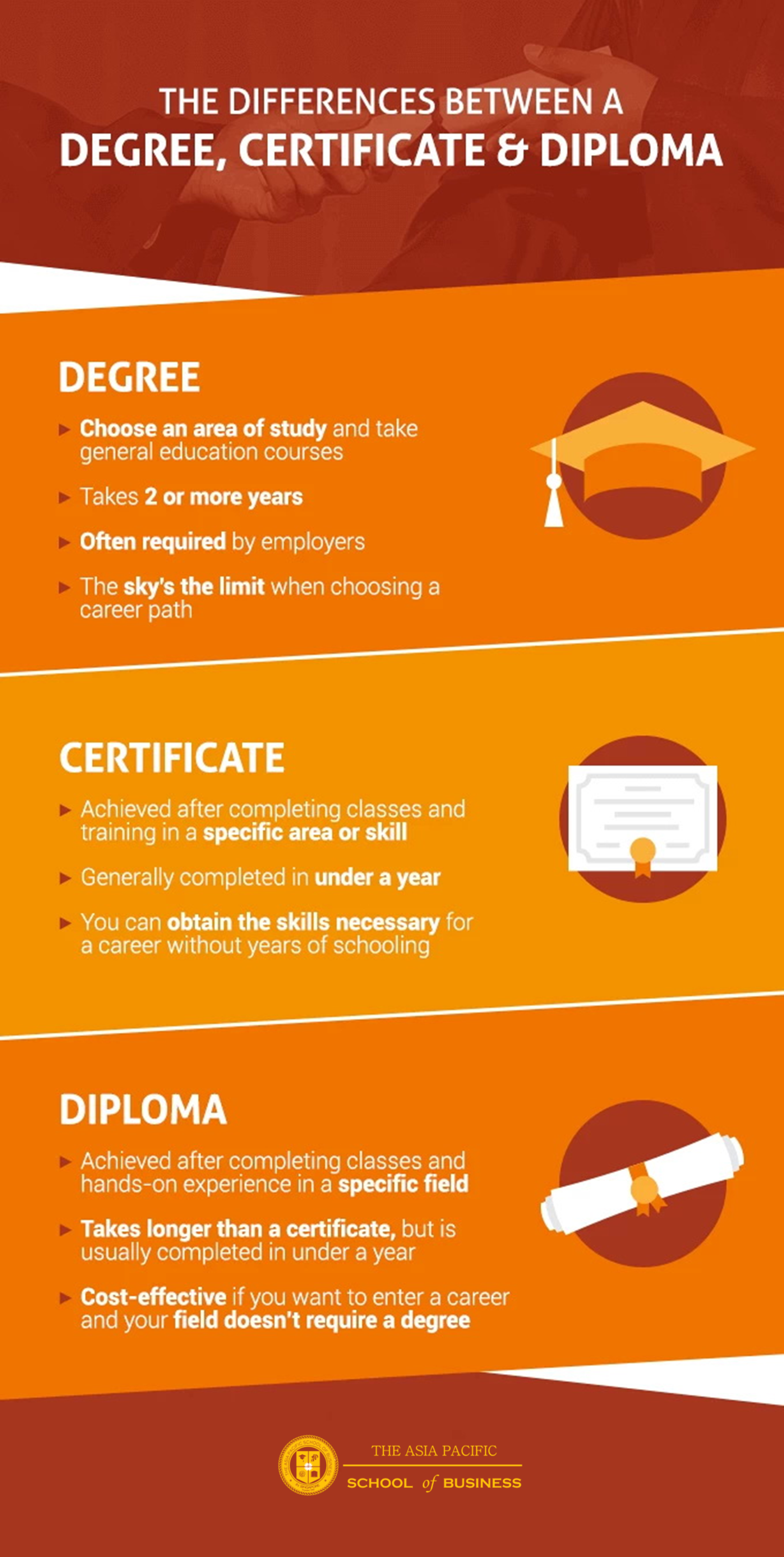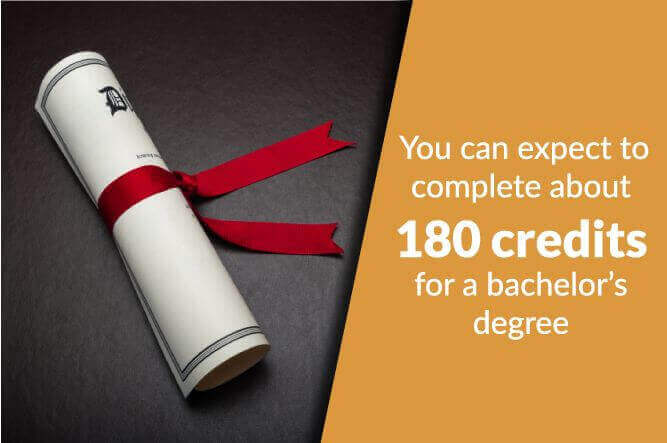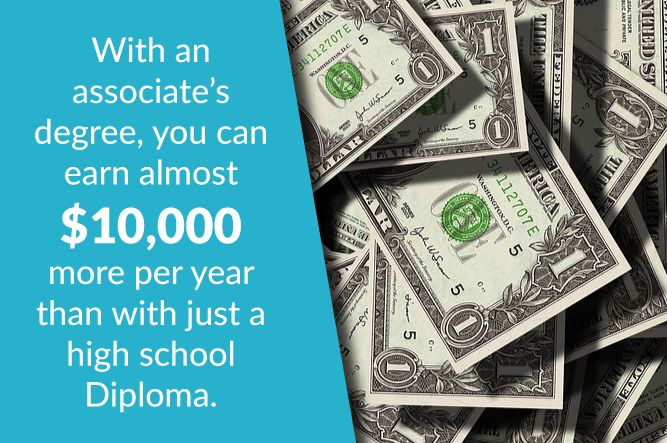Certification & Honor
Certification & Honor

Not long ago, the most traditional way to start a career was obtaining a four-year degree. Now, with people changing jobs and careers more often than in the past, is a four-year degree worth it? It’s one of the most common things you may envision when getting prepared for a vocation, and it’s certainly a viable option. However, there are additional routes you can take when considering a new career.
What if you’re already on an established career path and it’s time for a change? A four-year degree is always a choice, but there are also other degrees as well as certificates and Diplomas that can be valuable – and that can get you where you want to be quicker.
What Is the Difference Between a Diploma, Associate’s, and Certificate?
One of the biggest differences between a degree, certificate, and Diploma is the time it takes to earn them. A degree comes in many forms and takes the longest to complete. It can be an associate’s, bachelor’s, master’s, or even a doctorate. A degree can take anywhere from two to four years or longer.
Certificate programs often take months instead of years, and some can even be obtained in conjunction with a degree program. Diploma programs offer a more in-depth curriculum than a certificate, but they are more like a certificate than a degree.

What Is a Degree?
A degree is an advanced education option where you pick an area of study to be your major. However, in addition to classes that are specific to your major, you must also complete general classes, like English, history, math, and other topics. This provides a well-rounded education.
What Are the Requirements for a Degree?

The requirements for a degree can vary greatly depending on the major you choose. Generally, you can expect to complete about 180 credits for a bachelor’s degree, and you’ll need a time investment of about four years as a full-time student. A master’s degree is typically completed after earning a bachelor’s and can take up to two years to earn. A doctoral program usually starts after you earn a master’s and can extend for several years. The exact time period varies depending on the program and area of study.
What if you don’t want to spend the time to obtain a bachelor’s degree? There are many fields where you can benefit from an associate’s degree‑ but you may be asking, “Then, how many credits is an associate’s degree?” An associate’s degree is about half of what it takes to earn a bachelor’s degree, so around 90 credits. For a time investment, it will take about two years to complete as a full-time student. There are flexible options, however, where classes can be completed online, on weekends, or during the evening.
What Are the Advantages and Disadvantages of a Degree?
One advantage of a degree is that many employers often require one, even if your major doesn’t necessarily apply to the job. Embarking on the journey for a degree and seeing it through to completion also can show commitment and dedication, which can be advantageous in the job market.

Other benefits to earning a degree include:
- Better potential for earning higher salaries. With an associate’s degree, you can earn almost $10,000 more per year than with just a high school Diploma.
- More marketable and desirable for jobs beyond entry level.
- Learning additional skills like critical thinking and analysis.
- Networking opportunities for future career options.
- Better job benefits like insurance, retirement, and possibly even travel.
A couple of disadvantages when looking at a degree program are the cost and the time it takes to complete. Even though most institutions offer financial aid of some kind, degrees can still be the most expensive form of higher education. They also usually take the longest to complete and so require a significant time investment.
What Is an Associate’s Degree and When Can It Be Helpful?
An associate’s degree is a degree you can earn in about two years. There are many reasons an associate’s degree can be beneficial in the job market, such as:
- You have completed some college and would like to finish up a degree as quickly as possible.
- Your desired job field requires an associate’s degree.
- You’d like to complete a degree program but are looking for a different option than just a bachelor’s.
- You already have a degree and are interested in adding another.
As with a bachelor’s degree, an associate’s degree requires the completion of general education courses to help provide a well-rounded education.
What Types of Careers Can You Pursue With a Degree?
The sky is the limit with the career paths you can choose when looking to get a degree. If you’re interested in becoming a veterinarian, for example, you’ll want to choose a major like biology or even animal science to get you the background you need.
An associate’s degree in veterinary technology will get you the knowledge and experience to be an integral part of a vet’s office, without having to spend four years to get there.
What Is a Certificate?
A certificate is achieved after you complete the required work in a specified area or skill. It doesn’t require the general courses like a degree does; instead, it requires just the classes and training relating directly to the specific area of study. A certificate doesn’t offer an overview of the area of study like a Diploma program does.
What Are the Requirements for a Certificate?
Requirements for a certificate can vary depending on what the field is. In many cases, you can expect to complete a certification program in under a year. Possessing a certificate can help you build credibility in your chosen field.
What Are the Advantages and Disadvantages of a Certificate?
Certificates are advantageous if you are looking to change careers and you already have a degree, or if you already have some work experience or schooling in your desired area of study. By completing a certificate, you can get the skills needed for a different career without having to go back to school to obtain another degree.
You can also get a certificate if you are looking to build on your current career or are looking at entering a different part of your industry.

One disadvantage of a certificate is that it can be somewhat limited. You’ll have career options based on your certification, but it may be difficult to branch out from there without gaining additional experience or certifications.
What Are Some Career Options After I Get a Certificate?
Where you end up going with your certificate depends on which field you choose. For instance, take a look at cosmetology. It’s more than just applying makeup and cutting people’s hair. As a cosmetologist, you’ll also be providing people with information to care for their hair, skin, and nails. A certification program provides you with the knowledge and experience you need to ensure you’re giving your clients the most accurate information and best quality services. A certificate is required for practicing; if you’re caught working – or working for someone – without a certificate, you can face serious penalties.
Massage Therapy is another fast-growing career, and to enter, a certificate can be beneficial. You might look at obtaining a four-year degree in something like Athletic Training if you choose to become a massage therapist; however, a certificate will get you working with people quicker and with less out-of-pocket cost for you.
What Is a Diploma?
A Diploma is more in-depth than a certificate and can take a little longer to earn, but still usually less than a year. Diploma programs are also often more technical. The classes taken in conjunction with earning a Diploma allow you to gain a thorough understanding of your field of study, though you won’t earn a degree upon completion of the program.
What Are the Requirements for a Diploma?
Diploma programs offer field-specific classes designed to provide you with the knowledge you need to succeed in the job market. Diploma programs also provide hands-on experience, so you can learn and practice the skills you will be using on a daily basis.
What Are the Advantages and Disadvantages of a Diploma?
A Diploma can be advantageous if you’re looking to make a career change in a relatively short amount of time and the field you’re entering doesn’t require a degree. Since Diplomas are often more technical or trade based, they are helpful when wanting to pursue a career such as an electrician or a dental assistant.
Some other advantages to a Diploma include:
- They can be completed in a relatively short amount of time
- They are cost-effective; they cost less than a full-fledged degree
- You don’t have to worry about prerequisites or other complicated enrollment procedures you may find with a degree program
- Class schedules are often flexible as most attendees are working professionals
- Classes are focused on the exact skills you will need in the field
- Diploma programs usually offer some kind of internships or externships, so you can gain practical experience and also network for future job opportunities.
One of the differences between a Diploma and an associate’s degree is the general education courses; you’ll be required to take those to receive an associate’s degree, but not when you work toward a Diploma.
What Are Some Career Options for a Diploma?
The health care industry is a rapidly growing field with many opportunities, though it can be overwhelming to think about entering that field. You can enroll in a Diploma program like Practical/Vocational Nursing in much less time than it takes to earn a degree. You can play a key role in a medical setting: providing care and medicine for patients and working alongside doctors and other medical personnel.
The career path to becoming a personal fitness trainer is also adequately paved with a Diploma program. Rather than getting a four-year degree in sports medicine or a related major – which may limit where you’d be able to get a job – classes for a Diploma will teach you valuable skills for helping people with their nutrition and exercise regimes in significantly less time and cost for you.
Some other options for Diploma programs include:
- Electrical Technician
- IT Administrator
- Dental Assistant
How Do I Know if an Associate’s, Diploma, or Certificate Is Right for Me?
There are many choices out there, and it can be difficult to know which option is right for you. The program that will work best for you will depend on many personal factors. You’ll want to consider:
- How much time do you have to complete classes? What are your goals as far as program completion? If you’re looking to change to a new career as quickly as possible, a Diploma or certificate may be the best option. If you’re working full time, you’ll also want to be sure you pick a program where classes are offered in the evenings, on the weekends, or online.
- The field you’d like to enter. If you’re looking to enter the field of criminal justice, you may need to complete a degree to get the education you’ll need. However, if you’re interested in being a personal trainer, then a Diploma will likely be sufficient.
- Financial Aid. Money may be another factor in determining whether an associate’s degree, Diploma, or certificate is right for you. With Diplomas and certificates generally costing less than a degree, they can be the more cost-effective option when you’re looking to embark on a new career. Even an associate’s degree may be more cost-efficient and work just as well as a four-year degree, depending on your goals.
- Evaluate your skills and interests. As with any career, whether you’re looking to enter the job market for the first time or you have an established career and are looking to make a change, your skills play an important part in choosing an education program. Look at whether you are good with administrative duties, are skilled at building things, are good at problem-solving, or if you are interested in working in a specific field like health care. Evaluating your skills and interests can help you pick a program that will work best for you and will lead you to a job you’ll be excited about.
The Takeaway
In a world where a variety of advanced education programs can be completed in less than a year, is it even worth it to get a four-year degree? The short answer: It all depends on your goals. The college experience and having the educational foundation a four-year degree provides is certainly a valuable commodity to possess.
For those who are working while attending school, are looking to change career fields, or are wanting to run down their career path as quickly as they can, the traditional four-year degree is certainly not the only option. Thoroughly evaluating all your goals and taking a look at where you plan to be in the future will be critical in determining which option will equip you best for your career.
Even once you have an idea in place, the information can still be overwhelming. At School of Continuing Education in The Asia Pacific School of Business, we are happy to help at any point during the process. If you need assistance determining which program is best for you or if you have questions about the differences between your options, contact us today.











